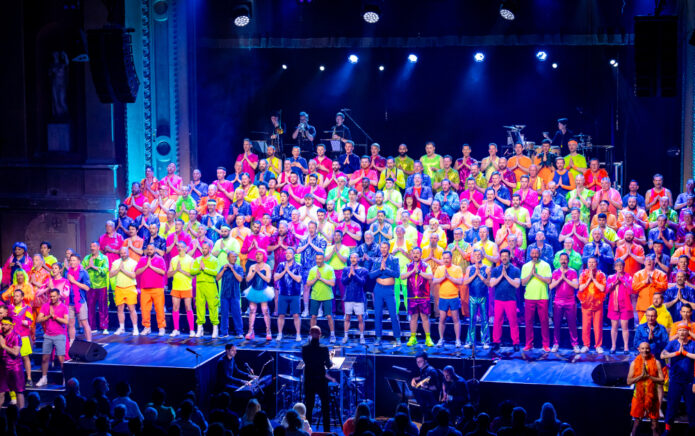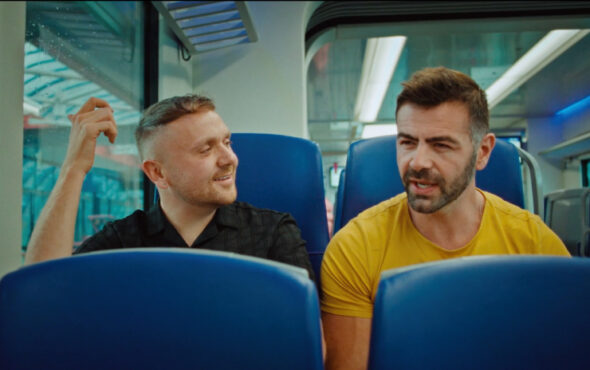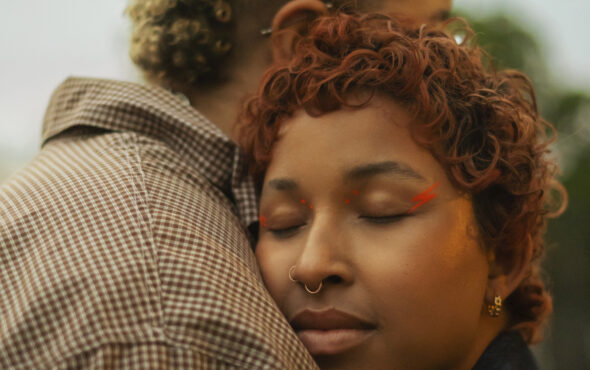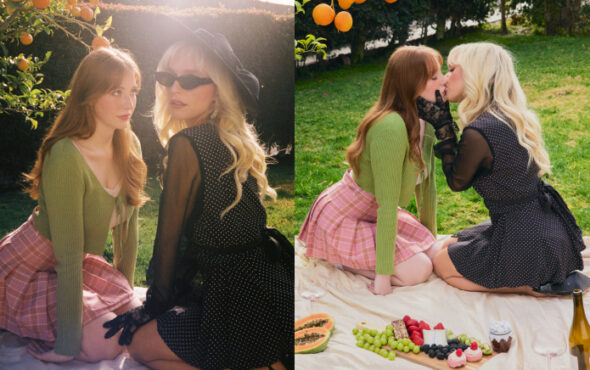
At the heart of Rob Madge’s one-person show My Son’s a Queer (But What Can You Do?), is their love for the stage. The 26-year-old actor, who hails from Coventry, England, has been professionally performing since they were nine in West End renditions of Mary Poppins, Oliver!, and Les Misérables. After successfully launching My Son’s a Queer at the Edinburgh Fringe Festival, Madge brought the performance to London, first to the Garrick Theatre, and now the Ambassadors Theatre.
An ode to their childhood love of all things Disney and musical theatre, Madge was inspired to write about their childhood experiences of dressing up with their dad to sing Disney hits and putting on quite the performance, when they rewatched old VHS tapes in their family home during lockdown. Inspired by some laugh-out loud moments, as well as the love and acceptance they felt by their family growing up, My Son’s a Queer is a heartfelt and joyous celebration of loving your kids for who they are and sharing valuable experiences of parental acceptance in the queer community. Here, we sat down with Madge to find out more about the show and its impact.
Tell me about the inspiration for My Son’s a Queer? When did you know you wanted to bring this story to the West End?
My Son’s a Queer is a show all about putting on shows in your living room, going back to your childhood and having to look through your old VHS tapes, and also what it means to be a good parent and ally to the LGBTQ+ community.
I was living back at my family home during the pandemic, and I stumbled across all of these old VHS tapes of when I used to put on these outrageous shows in my front room and how my parents would get involved. And that really was the genesis of the show. Basically, starting as a stand up comedy routine was what I was intending to do, but then people would tell me things a little bit deeper such as, ‘My dad would never have let his son wear wigs and dresses.’ We talk a lot about what it means to be a good supportive parent, which you don’t see that much of in queer stories and I think it’s high time we celebrate the supportive ones.
It’s an emotional story, one where you have to explore personal trauma night after night. How do you cope with that?
It’s always different. It always totally takes me by surprise each night how I will respond to certain things that happen on stage. We have lots of video footage of my beloved family, which I’m always proud to show off, but sometimes that can be quite upsetting because some of them aren’t with me anymore.
I always feel great pride in showing them off. But it always changes on a daily basis. And if there’s a supportive audience that really gets me through it and you sort of have to create a bit of a character, and although it is my story, I have to think of myself as a storyteller first and foremost and a performer, and that helps me distance myself in a way.
I hope by the end of it, it becomes less my story and it’s more of a shared experience and everyone else can relate to it in some way. So, I just like to think of me and my family as the ones that are helping tell a story rather than being it. Because if I think about it too hard, yeah, it can get overwhelming.


The show’s story is deeply personal but from what you gather at its end, it’s a story shared by so many queer people. How does it feel now to know that so many others had similar experiences to you growing up?
I feel vindicated. I feel really justified. I thought I was such a weirdo. Turns out I wasn’t, there were loads of us. I thought I was the odd one out. And how could I be the odd one out when so many of us were doing it? And I think that’s what a lot of people also would have felt, people make them feel different and strange and alone.
And turns out, little did we know in living rooms across the country, across the world, there were little boys and girls and non-binary kids putting on all these shows and being whoever they wanted to be. And there was a whole community of us even then, even though we didn’t know it yet. So, when people say they relate to it, yeah, makes me very happy and makes me feel more popular than I was at school.
It’s a painful time for the trans community right now. But My Son’s a Queer is a light in the darkness. Is that something you always wanted to achieve with the show?
I feel like we are in a world right now full of division and so much hatred more than I’ve known ever in my lifetime, really in the past couple of years. It’s just escalated to an awful degree. And I really am desperate to show that there is joy and light amongst all of that chaos and there is truth to our existence.
We aren’t these mythical things that happen on Twitter debates and we exist as human beings and we thrive as them. And that’s great. And that can be celebrated. And we must focus on celebration and uplifting one another, because otherwise it’s awful. So let’s not make it awful, you know? And it’s really important that we uplift one another.
Get tickets to see My Son’s A Queer, (But What Can You Do?) at the Ambassadors Theatre until 18 March 2023.



